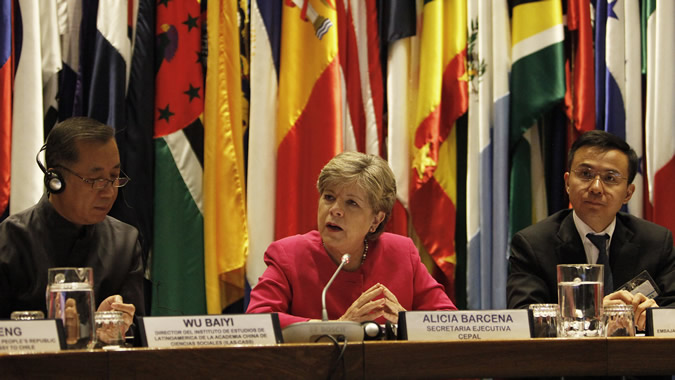Latin America and China Share Urbanization Challenges, Experts Agree
Forum on urban development was held at ECLAC’s headquarters in Santiago, Chile.

China and Latin America and the Caribbean region have common opportunities and challenges in terms of urbanization, which opens significant room for cooperation, experts agreed today at the inauguration of the Forum on Sustainable Urban Development in China and Latin America and the Caribbean at ECLAC’s headquarters in Santiago, Chile.
The event was organized by the Economic Commission for Latin America and the Caribbean (ECLAC) along with the Institute of Latin American Studies of the Chinese Academy of Social Sciences (ILAS-CASS), with the support of CAF-Development Bank of Latin America. The opening session was attended by Alicia Bárcena, Executive Secretary of ECLAC; Wu Baiyi, Director of ILAS-CASS; and Zhang Run, Charge d’Affaires of the Embassy of the People’s Republic of China in Chile.
“China as well as Latin America and the Caribbean have had to provide effective solutions to the various challenges and negative consequences of the urbanization process,” said Bárcena, who recalled that more than 80% of the Latin American population live in cities, a figure that is expected to rise to 85% by 2030.
The senior representative stressed that urban development must be included in the post-2015 development agenda currently under debate by way of setting the Sustainable Development Goals (SDGs) and in the negotiations to reach a new global climate agreement by next year.
Bárcena also said that ECLAC, through its Sustainable Development and Human Settlements Division, aims to deepen its relations with ILAS-CASS through the development of a joint cooperation program on urbanization in Latin America and China.
Along the same lines, Wu Baiyi highlighted the results of existing cooperation between both institutions and stressed the importance of fostering the exchange of experiences and bi-regional collaboration, considering that “Latin America and China are running the same race, but from different backgrounds,” he said.
At the end of his presentation, ILAS-CASS Director gave ECLAC’s Executive Secretary the book “Xi Jinping: The Governance of China,” translated into Spanish this year.
“There is a need to deepen our academic and governmental cooperation in order to achieve success in our own processes,” said Zhang Run, who read a letter from the ambassador of China in Chile, Li Baorong.
Contact
Public Information Unit
- prensa@cepal.org
- (56 2) 2210 2040